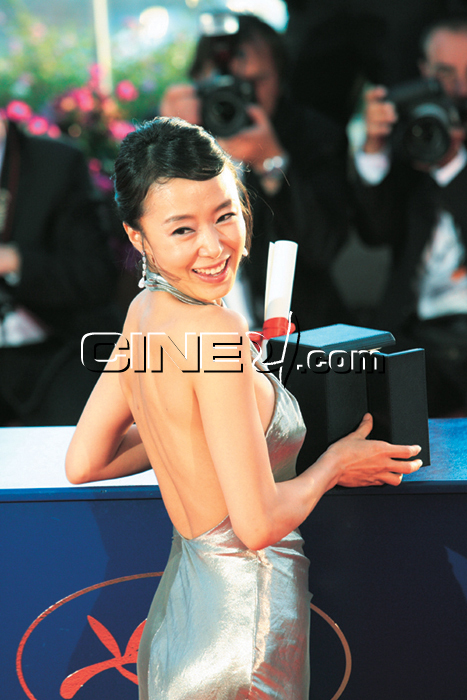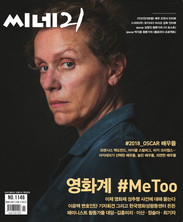전도연이 <밀양>으로 여우주연상을 받기 위해 칸의 무대에 오르자 언론계 동료들이 가장 많이 공통적으로 해온 질문이“저 배우 한국에서 빅스타야?”라는 것이었다.
대답은 쉬웠다. “아니, 저 배우의 이름만으로 영화가 팔릴 수 있을 정도로 그렇게 ‘빅스타’는 아니야. 그렇지만 자기 세대 중 한국에서는 의문의 여지없이 가장 훌륭한 배우지.” 두 번째 질문이 던져졌다. “그럼 이전 작품은 어떤 게 있어?”
이건 좀더 어려운 질문이었다. 영화 제목을 대는 게 문제가 아니라, 동료들이 봤을 만한 영화 제목을 대야 했기 때문이다. “뭐, 7년 전 칸 비평가 주간에서 상영됐던 <해피엔드>에서 대단했지.”(이 영화를 기억해내려 안간힘을 쓰는 표정들- ‘비평가 주간’의 영화를 보는 기자들은 몇 안 된다) “그리고 칸 마켓에서 상영됐던 <내 마음의 풍금>과 <피도 눈물도 없이>에서도 멋졌었지.”(멍한 얼굴들) “그래도 <스캔들-조선남녀상열지사>에 나온 건 기억하지?”(또 멍한 얼굴) “그래서 저 배우의 특징이 뭔데?”라고 반문해왔다. 그 대답이 더 쉬웠다. “영화마다 다른 모습을 보여주지. 저 세대 대부분의 판에 박힌 듯한 여배우들과는 완전히 다른 거지. 모든 역에 완전히 몰입하거든.” “좋아.” 그리고 그들 대부분은 그 상이 얼마나 받을 만한 사람한테 수여됐는지, 전도연이 2004년 <클린>의 장만옥 이후 두 번째로 칸에서 여우주연상을 수상한 아시아 배우라는 것으로 기사를 쓰려고 가버렸다.
더 주목할 만한 건 전도연이 아시아 제작 영화로 상을 수상한 첫 번째 아시아 여배우라는 거다(<클린>은 캐나다-프랑스-영국 공동제작이었고, 대부분의 대사가 영어였다). 이 점이 칸의 가장 부끄러운 비밀이다. 칸에서 여우주연상을 받은 69명의 여배우 가운데(어떤 해에는 공동으로 수상하기도 했고, 어떤 해에는 아예 그 부문 상이 없기도 했다) 유럽인이 67%(46명)로 압도적이고, 25%(17명)가 북미인이며, (전도연과 장만옥을 제외한) 나머지 6%가 남미와 아프리카, 이스라엘인이다.
영국의 헬렌 미렌과 바네사 레드그레이브, 미국의 바버라 허시(2년 연속 수상!), 프랑스의 이자벨 위페르와 같은 몇몇 여배우들은 두번씩 수상하기도 했다. 수상에도 불구하고 희미하게 사라져버린 이들도 있다. 피아 데게마르크, 옥타비아 피콜로, 키티 윈, 비욕 같은 이들은 도대체 어떻게 됐을지…? 하지만 상은 프랑스인, 영국인, 미국인이 큰 비중을 차지한 가운데 서구인들에게 압도적으로 돌아갔다.
칸영화제가 늘 프랑스가 자금을 댄 프로덕션을 가장 선호하며 유럽과 미국영화의 쇼케이스를 무엇보다 우선시하긴 하지만, 심사위원들이 아시아 연기에 대해 의식적으로 차별하고 있다고 말하는 것은 옳지 않다. 개인적인 이론은 (역시 서구인들이 압도적인) 심사위원들이 단순히 아시아의 연기 스타일과 감정적인 내용에 대한 적절한 반응을 결핍하고 있다는 것이다. 장만옥과 전도연의 연기 모두 유럽의 아트하우스영화가 선호하는 부류의 “내적” 연기라는 것, 그리고 전도연의 고도로 개인적인 연기 기법이 대부분 아시아의 것들보다는 서구 연기방식에 더 가깝다는 것은 주목할 만하다.
그래서 필자 마음은 전도연에게 가 있지만, 그녀가 상을 탔다고 해서 경력의 경로를 바꾼다거나 미국 에이전시를 고려하는 식으로 빗나가서는 안 될 것 같다. 가장 큰 아이러니는 전도연이 상을 탄 해가- 김기덕의 <숨>의 영예로운 예외, 그리고 왕가위의 <마이 블루베리 나이츠>와 <밀양>의 자격있는 예외가 있긴 했지만- 칸의 아시아 선정작들이 유럽의 감수성에 영합한 부류의 아시아영화들(<나이트 트레인> <블라인드 마운틴> <플레저 팩토리>)로 채워지면서 어이없을 정도로 형편없었으며 대표성도 상실한 해였다는 것이다.
When Jeon Do-yeon went onstage at Cannes this year to receive her Best Actress award for "Secret Sunshine," the commonest question from my press colleagues was: "Is she a big star in South Korea?"
That was easy to answer. "No, it's not like she's a 'Big Star' - her name can't sell a film alone - but she's unquestionably the finest actress of her generation in South Korea." To which came the second question: "So, what's she done before?"
That was a tougher one - not naming the films, but naming films my colleagues may have seen. "Well, she was terrific in 'Happy End', which was in Cannes' Critics' Week seven years ago." (Faces struggling to remember the film - few journalists ever see movies in Critics' Week.) "And she was also terrific in 'The Harmonium in My Memory' and 'No Blood No Tears', which were in the Cannes market." (Blank faces.) "But you remember her in 'Untold Scandal', right?" (More blank faces.)
"So, what's her special quality?" came the replies. That was easier. "Well, she looks different in every single film, completely unlike most of the cookie-cutter actresses of her generation. Every role, she completely absorbs herself in."
"OK." And off most of them went to write how well-deserved the prize was, and how Jeon was only the second Asian actress to win the award at Cannes, after Maggie Cheung for "Clean" in 2004.
More notably, she is the first Asian actress to win the award for an Asian production. ("Clean" was Canadian-French-British, and largely in English.) And here is Cannes' most shameful secret: of the 69 actresses who have won Best Actress prize at Cannes (some years the award was shared, some years there was no Best Actress prize), a staggering 67% (46) have been European, 25% (17) North American, and the remaining 6% (excluding Jeon and Cheung) from Latin America, Africa and Israel.
Some actresses have won twice: the UK's Helen Mirren and Vanessa Redgrave, the US' Barbara Herschey (on subsequent years!), France's Isabelle Huppert. Others went back into obscurity, despite the award: whatever happened to the film careers of Pia Degermark, Ottavia Piccolo, Kitty Winn and Bjork? But overwhelmingly the prize has been a western one, with a heavy slant towards the French, British and Americans.
Though the Cannes festival has always been, first and foremost, a showcase for European and American movies, with major favouritism towards French-financed productions, it would be wrong to say that juries have consciously discrimated against Asian performances. My own theory is that the jurors (also, overwhelmingly, western) simply lack the proper responses to Asian acting styles and emotional content. It's notable that both Cheung and Jeon's performances were both "interior" ones of the kind favoured by European arthouse movies - and Jeon's highly personal acting technique is closer to that of western performers than most Asian ones.
So, my heart goes out to Jeon, but she should not be deflected by the award into changing her career course or thinking about getting a US agent. The biggest irony is that she won in a year when Cannes' Asian selection was - with the honorable exception of Kim Ki-duk's "Breath," and the qualified exceptions of Wong Kar-wai's "My Blueberry Nights" and "Secret Sunshine" - laughably bad and unrepresentative, stuffed with the kinds of Asian films ("Night Train", "Blind Mountain", "Pleasure Factory") that pander to European sensibilities.



